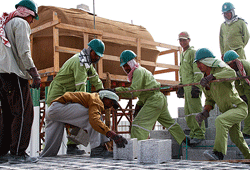
The Qatar Foundation’s guidelines for treatment of migrant workers would cover many construction workers in the nation to set up the 2022 World Cup.
The 2022 World Cup competition in Qatar may be nine years away, but the tiny nation is already making plans to improve the country’s infrastructure and image. While Qatar still has a long way to go in meeting international labor standards, especially when it comes to migrant workers, there are already some encouraging signs coming out of the country. The Qatar Foundation recently unveiled a set of detailed standards for the treatment of the potentially hundreds of thousands of migrant workers hired by the foundation, its contractors, and all subcontracting agencies to build the infrastructure for the event.
In doing so, the foundation expresses its goal to “initiate a snowballing process towards transforming workers’ quality of life and…set an exemplary model for ethical treatment of workers nationwide.”
More than 1 million new migrants are expected to travel to Qatar seeking construction work and other jobs created by the World Cup. They will join 1 million migrants already in the country who have contributed to transforming Qatar into an economic giant, most visible in the evolution of the nation’s skyline from an empty expanse to one filled with opulent skyscrapers. Despite Qatar’s extreme wealth and economic advancement, migrant workers have labored in a system that denies them core worker rights, including the right to form unions.
Migrant workers are frequently forced to live and work in unsafe and miserable conditions, deprived of time for rest and pressured into accepting contracts that underpay the hours they work.
The Qatar Foundation’s Mandatory Standards of Migrant Workers’ Welfare for Contractors & Sub-Contractors is a significant step forward, says Nader Tadros, Solidarity Center Middle East and North Africa regional program director. “We commend the foundation for following through on the country’s international promises to protect migrant workers and improve working conditions. Despite the need for continual improvement, we see this as a positive step in the right direction as the country begins construction efforts for the 2022 World Cup.”
The 51-page document lays out lengthy rules for acceptable treatment and conditions for migrant workers, including regulations prohibiting workers from being charged recruitment fees to obtain work and mandating that all migrant workers receive training on their rights under Qatari law. The regulations further stipulate that all contracts and training materials be provided in the workers’ own languages and that workers retain their passports while in the country.
Since 2009, the Solidarity Center has assisted Qatari civil society organizations in their efforts to improve the lives of migrant workers. Lending expertise to the Qatari National Human Rights Committee (QNHRC) and the Qatar Foundation to Combat Human Trafficking (QFCHT), the Solidarity Center has served as a resource for Qataris looking to advance working standards for migrant workers.
